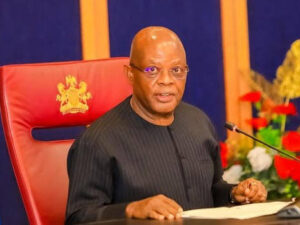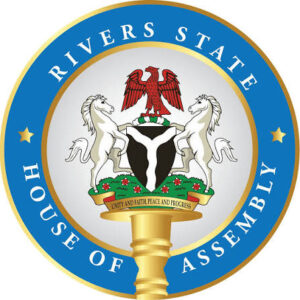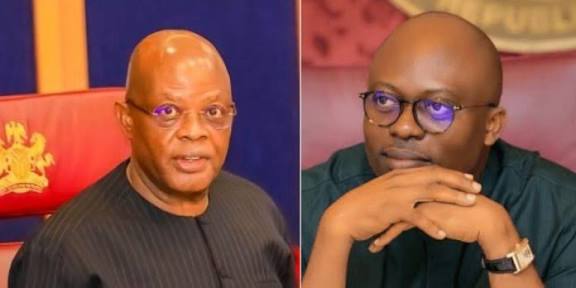By Headlinenews.news Investigations Desk
PORT HARCOURT — Fresh controversy has erupted in Rivers State after newly released figures from the National Bureau of Statistics (NBS) revealed that the state received an unprecedented ₦416.36 billion in revenue between March and August 2025 under the stewardship of Vice Admiral Ibok-Ete Ibas, the federally appointed administrator.
The staggering sum consists of ₦254.36 billion in federal allocations and an estimated ₦162 billion in internally generated revenue (IGR). Yet despite these inflows, there is rising anger among Rivers citizens who complain of a near-total absence of visible development projects.

The Numbers at a Glance
Federal Allocation (March–August 2025): ₦254.36 billion
March: ₦44.66bn
April: ₦44.42bn
May: ₦42.80bn
June: ₦42.30bn
July: ₦38.42bn
August: ₦41.76bn


Estimated IGR (₦27bn monthly): ₦162 billion
Total Revenues (6 months): ₦416.36 billion
Allegations of Mismanagement
Critics, including political commentator Emeka Mba, allege that within this period contracts were quietly awarded, arbitrary withdrawals made, and funds disbursed in secrecy, with no public records or tangible infrastructure to show for it.
One of the most glaring controversies is the purchase of 2025 Toyota Land Cruiser Prado SUVs for the 27 members of the Rivers State House of Assembly, each reportedly costing at least ₦150 million — a total outlay exceeding ₦4 billion. The expenditure, Mba argues, was not included in the state’s budget and served as a means to secure the lawmakers’ silence.

The Legal Question: Who Should Demand Accountability?
Here, however, Mba’s analysis falters. He calls on the Rivers State House of Assembly to probe Admiral Ibas. Yet under emergency administration imposed in Rivers, legislative oversight of state finances rests not with the suspended State Assembly but with the National Assembly in Abuja.
The 1999 Constitution (Section 305 and subsequent emergency provisions) empowers the President, once emergency rule is declared, to vest authority in a sole administrator whose actions are answerable to the federal government. By extension, the National Assembly — not the Rivers House of Assembly — holds the legal mandate to demand accountability from Ibas on the use of public funds.

Thus, while Mba’s demand reflects genuine public frustration, the constitutional mechanism for checks and balances lies with the federal legislature. The Rivers Assembly members’ acceptance of SUVs further complicates matters: their moral authority to demand accountability is compromised, while their legal authority has already been suspended.
Historical Context: A Familiar Pattern
Rivers State, one of Nigeria’s wealthiest oil-producing states, has long been a theater for resource mismanagement controversies. From the post-derivation boom of the early 2000s to recent battles over oil revenue sharing, questions of transparency have repeatedly dogged its leaders. What is new in this instance is the extraordinary revenue inflow under an unelected federal administrator.


Citizens’ frustrations echo past struggles in the Niger Delta: vast revenues flow into government coffers while poverty, unemployment, and infrastructure decay persist. The symbolism of luxury SUVs for politicians while ordinary people struggle for daily meals has only sharpened anger.
Analysis: Where This Leaves Rivers
1. Public Trust Deficit — The combination of secrecy, alleged arbitrary withdrawals, and visible indulgence (SUVs) has deepened mistrust between citizens and the emergency administration.
2. Legal Oversight Gaps — Unless the National Assembly asserts its constitutional role, Rivers’ revenues may remain largely opaque to the public.
3. Political Fallout — Admiral Ibas has reportedly dismissed calls for probe as a “fool’s errand.” Such defiance may embolden critics but also signals his confidence in federal backing.
4. Moral Questions — The participation of civil servants in conferring “awards” on Ibas, even as salaries reportedly lag, underscores a systemic culture of complicity.

Conclusion:
The figures are undeniable: ₦416 billion in six months should have transformed Rivers’ infrastructure, healthcare, and education. Instead, secrecy, allegations of waste, and misplaced priorities dominate the narrative.
While Emeka Mba captures the outrage of Rivers people, his call for state-level legislative oversight misses the constitutional point. Under emergency rule, only the National Assembly can demand a full audit and explanation from Admiral Ibas.
For now, Rivers citizens continue to ask the same burning question: Where has all the money gone?
Headlinenews.news Special Investigative Report.




